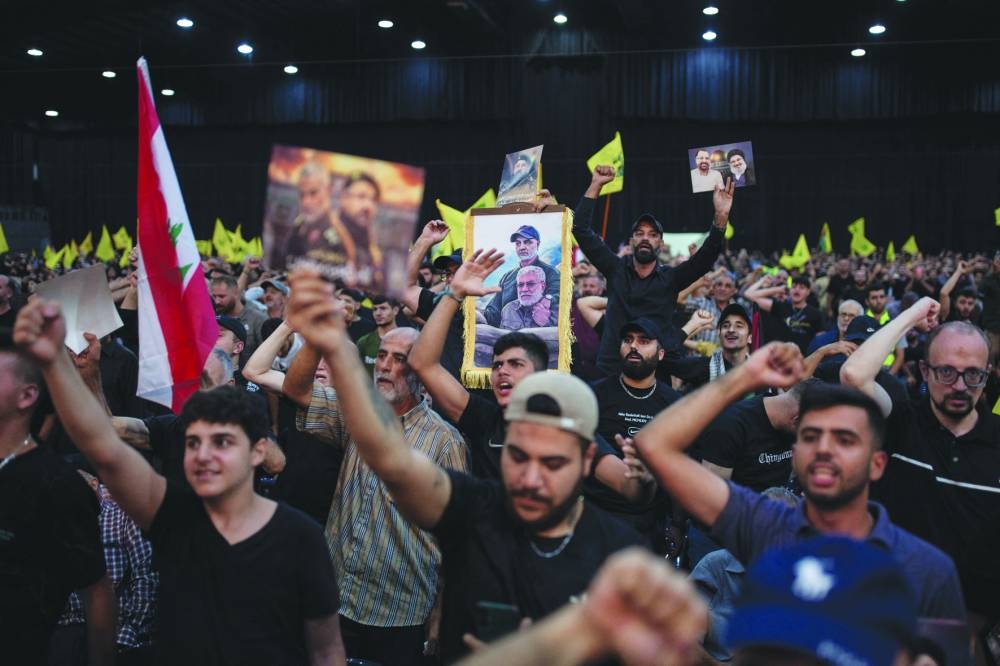Hassan Nasrallah said his Hezbollah group and Iran were “obliged to respond” to Israel as the Middle East braced for the pair’s promised retaliation following high-profile killings last week. The United States said earlier it was working “around the clock” to avert an all-out war in the region, following the killings last week of Hezbollah military commander Fuad Shukr in Beirut and Hamas political leader Ismail Haniyeh in Tehran.
Speaking in a televised address to mark one week since Shukr’s death, Nasrallah said Tehran “finds itself obliged to respond, and the enemy is waiting in a great state of dread”. Hezbollah was also “obliged to respond”, he said, adding that it will retaliate “alone or in the context of a unified response from all the axis” of groups in the region, “whatever the consequences.”
Minutes before his speech, Israeli jets flew low over the Lebanese capital, breaking the sound barrier. US President Joe Biden, whose country has sent extra warships and fighter jets to the region in support of Israel, held crisis talks on Monday with his national security team.
Biden called King Abdullah II of Jordan. “We are engaged in intense diplomacy, pretty much around the clock, with a very simple message - all parties must refrain from escalation,” Blinken said after joining other top officials in a White House meeting. Iranian President Masoud Pezeshkian hit out on Monday at what he called the “criminal acts” of Israel “against the oppressed and defenceless people of Gaza”, as well as for Haniyeh’s killing.
“The Islamic Republic of Iran is in no way seeking to expand the scope of war and crisis in the region, but this regime will definitely receive the response for its crimes and arrogance,” Pezeshkian said during talks with a senior visiting Russian official, according to the official news agency IRNA. Israel has not commented on the Haniyeh killing but confirmed it killed Shukr.
Hezbollah has engaged in near-daily cross-border clashes with Israeli troops. The group claimed several attacks on Israel on Tuesday, including one with “explosive-laden drones” targeting a barracks north of the coastal town of Acre. Regional councils in northern Israel urged residents to stay close to shelters yesterday after a barrage of rockets. In southern Lebanon, six Hezbollah fighters were killed in Israel strikes, according to a Lebanese security source. Lebanese Foreign Minister Abdallah Bou Habib, on a visit to Cairo, acknowledged that there was “a possibility of a war between us and Israel... We can’t deny that.”
A European diplomat in Tel Aviv said “a coordinated response” from Iran was expected against Israel but de-escalation efforts persisted. “That doesn’t mean there will be a simultaneous response from all fronts,” he added, declining to be identified as he was not authorised to speak on the issue. “We’re telling them they have to stop playing with fire, because the risk of flare-ups is higher than at any time since October 7,” he said. Numerous airlines have suspended flights to Lebanon or limited them to daylight hours. Lebanese national carrier Middle East Airlines put on extra flights for people wanting to leave or return, a company source said.
The Jeddah-based Organisation of Islamic Co-operation is to meet today at the request of “Palestine and Iran”, to discuss developments in the region, an OIC official said. The United Nations’ rights chief Volker Turk called on “all parties, along with those states with influence, to act urgently to de-escalate what has become a very precarious situation”.
The Israel-Hamas war in the Gaza Strip has already drawn in fighters in Syria, Lebanon, Iraq and Yemen. Israel’s retaliatory military campaign in Gaza has killed at least 39,653 people, according to the Hamas-run territory’s health ministry, which does not give details of civilian and militant deaths. In the occupied West Bank, Palestinian officials said that Israeli forces killed 12 people in three separate raids yesterday.

Supporters listen to a speech of Hezbollah leader Sayyed Hassan Nasrallah via a video, during a commemorative ceremony marking the first week since the killing of Hezbollah’s top commander Fuad Shukr, in the southern suburbs of Beirut, yesterday.

Supporters shout slogans before the speech of Hezbollah leader in Beirut.
